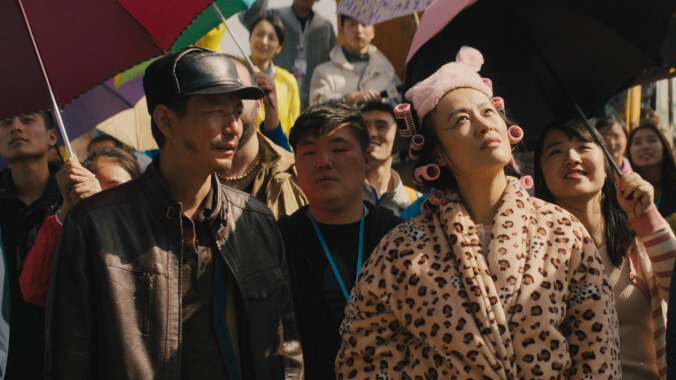Two years before Birds Of Prey, Cathy Yan made a splash with Dead Pigs


In the spring of 2013, more than 16,000 rotting pig corpses floated down the Huangpu River, the “Mother River” whose tributaries feed Shanghai’s water supply. Public outrage and an official investigation followed, eventually tracing the pigs to Zhejiang Province, about 60 miles outside the city. The animals had died of a disease called porcine circovirus that officials insisted was not contagious to humans, and a tangle of regulations amid a crackdown on black-market pork had led farmers to dump the remains rather than pay the government fees to dispose of them. The incident highlighted the contrast between Shanghai’s prosperous, ultramodern facade and forgotten rural communities devastated by pollution and neglect—the subject of writer-director Cathy Yan’s debut feature, Dead Pigs.
In the three years since Dead Pigs premiered at Sundance, Yan has become a Hollywood player thanks to her work on Birds Of Prey (And The Fantabulous Emancipation Of One Harley Quinn). The flamboyant eccentricity of that title is equally present in Dead Pigs, which takes the Huangpu River incident and fashions it into a vibrantly colorful, sharply funny kaleidoscope that, as its pieces shift, reveal cultural patterns of Chinese life in the 21st century. The film does so by tracing the intertwining fortunes of the Wang family: Old Wang (Haoyu Yang), a provincial farmer who’s among the first to throw a dead pig in the river; his sister, Candy (Vivian Wu), the owner of a local beauty shop who’s entrenched in a standoff with developers who want to tear down the family home; and Old Wang’s son, Zhen (Mason Lee), a busser at a Shanghai nightclub who’s tentatively romancing a wealthy socialite named Xia Xia (Meng Li).
Also thrown into the mix is American expat Sean Landry (David Rysdahl), whose nondescript appearance and lack of Chinese language skills make him an asset to people like Angie (Zazie Beetz), a “modeling agent” who specializes in providing a white face to smile and wave when a touch of Western ambience is needed—to cut the ribbon at a new shopping mall, for example, or pose as an “L.A. millionaire” to attract tenants to a new high-rise. Amusingly enough, he serves a similar function in Dead Pigs; he’s a living manifestation of the emptiness at the center of the city’s capitalist churn. Xia Xia’s symbolic role is similar, although she’s more of a stand-in for the frenzied scramble for designer status symbols that has made Shanghai a city of disposers and disposable, consumers and consumed. Every relationship in Dead Pigs revolves around money—or real estate, which is basically the same thing, especially in crowded Chinese cities.
Of course, critiquing the country’s eager sprint toward Western-style capitalism is nothing new in Chinese cinema. But Yan brings a snorting mirth to her version that turns late capitalist alienation into a funhouse ride. (The film’s executive producers include Ali Wong and Jia Zhangke, a wonderful summation of the blend of tones and cultures on display.) In one particularly farcical scene, a tense conversation between Zhen and Old Wang (about—what else?—money) is punctuated by impeccably timed elephant noises at a gaudy safari-themed cafe. In another, a rich patron threatens Zhen by making him read the brand label on his shirt. “It’s Gucci,” the bully snarls.
At times, Dead Pigs’ multiple threads are stretched thin as it freewheelingly bops from one storyline to another over two full hours. Although the film still sparkles, a trimmed-down version focused solely on the Wangs might have had the explosive power of a hand grenade. But the story isn’t the main attraction here. The real star of the movie is Yan, whose carnivalesque sensibilities emerge fully formed in this, her first feature. Fans of Birds Of Prey’s riotous color schemes will also find much to love in Dead Pigs, which similarly utilizes neon pinks and blues, leopard print and fake fur, VR headsets and karaoke sing-alongs, to enhance the delirious artificiality of the piece.
Yan was born in China and raised in America, a perspective that gives her a unique insight into the interplay between the two cultures. Here, she also adds a contrast between old and new, as Candy stubbornly sits in her ancestral home—lushly decorated like a vintage apartment in a Wong Kar-wai movie—doing ’80s aerobics videos and painting pictures of her fluffy, yapping dog as bulldozers reduce the surrounding neighborhood to rubble. Candy is a strong-willed woman you can’t help but root for, standing on her rooftop in curlers and bathrobe screaming at the excavator slowly creeping toward the building. Some directors look on the loneliness and soullessness of modern life and despair. Cathy Yan giggles.